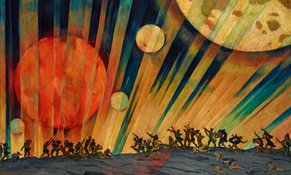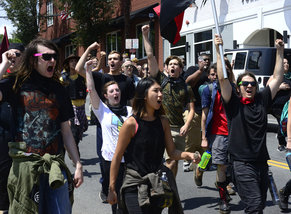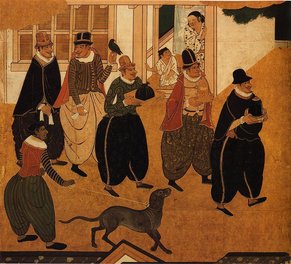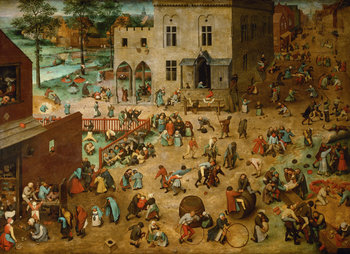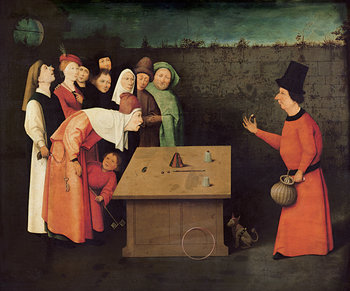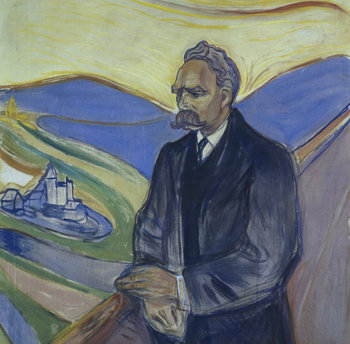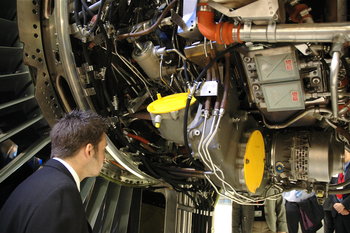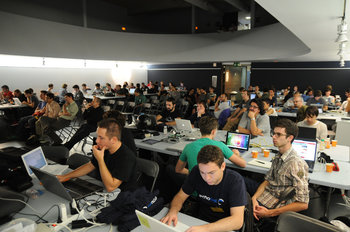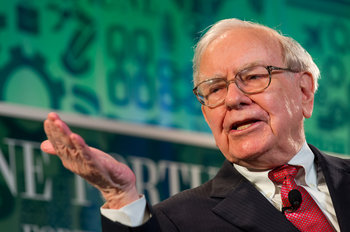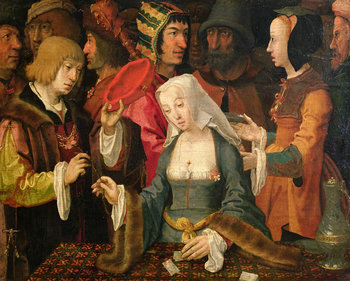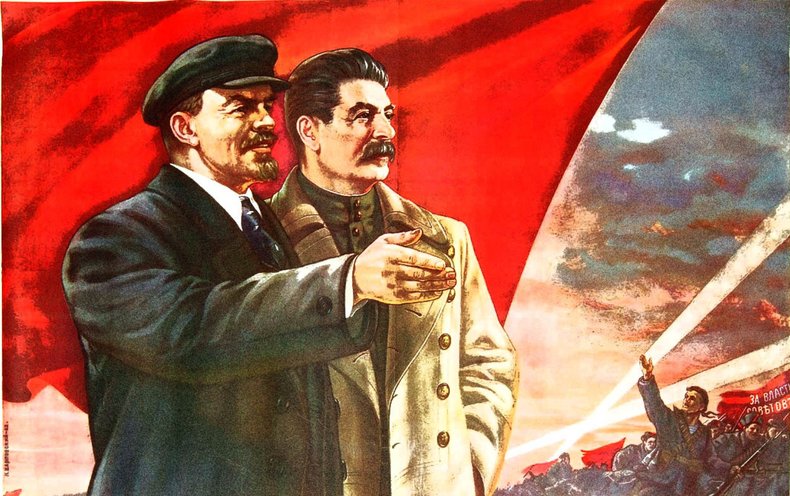
If anything is certain, it is that I myself am not a Marxist.Marxism is a school of thought loosely based on the theories of Karl Marx and Friedrich Engels particularly the idea that a collectivist classless society is desirable. This is a broad school of thought that has greatly influenced the social sciences since the middle of the 19th century. The following are the basic characteristics of Marxism.
~ Karl Marx
Collective Ownership
The foundational principle of Marxism is that the state should own all capital including all productive land, buildings, vehicles and machines. This positions the state as the only employer that assigns all labor to work. Likewise, by owning all capital the state must typically implement central planning to organize all production. This is often phrased as "common ownership" or "community ownership." In practice, this may resemble a monopoly such as having a single company that owns all property and makes all goods.Collective Rights
Marxists place the needs of the community over individual pursuit of opportunity. Individual economic rights such as the right to freely produce and retain the value you create are eliminated. For example, without property rights, a Marxist society may move entire communities from their homes to build an infrastructure project. This embrace of collective rights may stem into other areas such as the prioritization of the collective right to security over the individual right to privacy.Revolution
Marxism is designed to appeal to the downtrodden who feel that capitalism isn't benefiting them. It calls for conflict and revolution as opposed to civility and reform.Wealth Redistribution
Marxism promises to more evenly redistribute wealth. This based on the observation that where a small upper class own most property it may be in everyone's best interests to simply seize this property. On the surface, this appears to be rational but has serious complications that can't be ignored. For example, a capitalist who has built a large company is typically running it productively and creating much value. If a large bureaucracy or a collection of revolutionaries take over this property it may fall into disarray and become fully unproductive. Likewise, by dramatically seizing property you are destroying the profit motive and creating instability and insecurity.Class Struggle
Marxism views history and politics as a class struggle whereby the capital owning classes seeks to dominate labor.Lumpenproletariat
Lumpenproletariat is a Marxist term for anyone who isn't employable. Marx and Engels portray this class as unthinking and prone to manipulation. In terms of class struggle, Marxism represents the interests of the proletariat, or working class and is wholly dismissive of the lumpenproletariat.Alienation
Marxist alienation is the theory that capitalism alienates the worker from their human nature. This supposes that when the "workers" own the capital this alienation will go away and workers will live in harmony with their nature. This can be accused of magical thinking. For example, this theory supposes that coal miners in the former Soviet Union were living in a blissful state of harmony with human nature because the state owned their mine.Historical Materialism
Marxism is based on a materialist view of history whereby all features of society are assumed to be based on economic structures. This discards all other elements of the human experience in favor of the view that human life is simply a struggle to control material resources. For example, religion is portrayed as a tool of control of the masses as opposed to an element of the human experience or as a human need.Agency
Marxism assumes that individuals have low agency and are essentially victims of systems. For example, Marxists view all capitalist workers as alienated whether they are aware of this alienation or not. Workers who report high work or life satisfaction would be dismissed as having low self-awareness. This is a primary difference from capitalism that embraces human agency with the view that people are able to pursue opportunity and are the best judge of their own happiness.Incentives
Marxism enforces absolute equality whereby no individual is allowed to do better than any other individual. As such, incentives to develop talents, work hard, solve problems, serve customers and so forth are diminished or non-existent under Marxism. This is replaced with the idea that people will work for the benefit of the community. This is a somewhat odd inconsistency because Marxism portrays all of history as a brutal materialist struggle for power but then supposes that people will be motivated to work with no incentives. In other words, capitalists are assumed to have no altruistic motives whereas socialists are conveniently assumed to be completely altruistic.Anti-capitalism
Marxism is largely a criticism of capitalism with the view that it is an oppressive system that is contrary to human nature. Modern anti-capitalism tends to focus on the distributive inefficiency of capitalism as a few people end up with most of the wealth in a capitalist system. Destruction of the environment through the creation of economic bads is also a common modern criticism.Commodity Fetishism
Commodity fetishism is the theory proposed by Marx that products and services have become objects of worship. This includes the idea that material pursuits have become miserable substitutes for real human needs. For example, the pursuit of luxury goods that are perceived as creating social status as a substitute for earned respect from others.Totalitarianism
Communism was implemented in the 20th century as totalitarian states such as the Union of Soviet Socialist Republics. It is unclear if Marxism can be implemented in any other way in the real world at scale because it takes away individual economic freedoms. For example, if people aren't free to own capital or start a business they may tend to vote for the return of these freedoms in a democratic society.Markets
Markets are a competitive mechanism of exchange that reward producers that deliver what consumers want. These are very efficient for determining pricing, production levels and quality. Markets also provide incentives for firms to innovate and meet customer needs. Under Marxism, markets essentially go away as competition is replaced by the rule that nobody is allowed to get ahead. In 20th century communist societies, the inefficiencies of non-market economies produced low quality of life, low quality goods, surpluses, shortages and famine such as the Great Chinese Famine of 1959-61.Historical Determinism
Marxism is a form of historical determinism that asserts that capitalism contains the seeds of its own downfall. This downfall is traditionally portrayed as inevitable. However, many of the predictions of Marx regarding capitalism have failed to materialize. For example, Marx predicted that as capitalists automated more and used less labor, that profit margins would fall. The opposite has occurred. Likewise, Marx didn't envision the large and thriving middle class that capitalism produced in the 20th century despite ever increasing automation.Marxism As Necessity
As communist societies of the 20th centuries failed and reverted back to capitalism, modern Marxists tend to be less likely to claim Marxism is inevitable. This has largely been replaced with the argument that it is necessary for survival based on the observation that capitalism has produced economic bads such as pollution. This argument is marred by the poor environmental record of 20th century communist societies and obvious solutions to economic bads that could be adopted by capitalism itself such as markets for economic bads that limits them to some sustainable level i.e. cap and trade.Critical Theory
Critical theory is a postmodern school of thought that views everything in terms of power structures. This dismisses human agency and anything pleasant about the human experience in favor of the view that all human existence is a struggle for power. This is based on Marxist traditions whereby everything is viewed in terms of materialism. For example, a couple wouldn't form a family to enjoy the human experience but would rather be forced together by an oppressive system. Likewise, interactions within the family itself would be viewed as a materialist power struggle.Marxist Narcissism
Marxist narcissism is Marxist scholarship that is elitist, cynical, self-absorbed and detached from practical realities such as data. For example, if you ask people what motivates them they aren't likely to state that they are completely motivated by a materialist quest for power. However, this is the implicit assumption behind many Marxist theories.Capitalist Realism
Capitalist realism is the observation that capitalism has produced massive improvements in quality of life, education, health, lifespan and working conditions such that it requires an active imagination to think that it could be replaced. In 1800, no country had a life expectancy over 40. Currently, no country has a life expectancy below 50 with world life expectancy at 72.6 years.Libertarian Marxism
Libertarian Marxism is a class of theory that supposes that collectivism could thrive at small scale with little or no state involvement. This lacks any grand theory of how this would work at the level of a large and complex modern society but may be interesting in terms of the design of small communities and cooperatives.Socialist Pragmatism
Socialist pragmatism is the embrace of democratic socialism and social market economies that are based on democracy and capitalism but use regulations and taxation to improve things for the lumpenproletariat, working class and middle class. Socialist pragmatism is marked by a willingness to work within the global capitalist system that is supporting 7.6 billion people as opposed to overthrowing it. A classless society is typically adopted as an admirable distant goal that is viewed as currently infeasible.Summary
Marxism is an ideology and school of thought based on the idea that a "dictatorship of the proletariat" that enforces a classless society would be beneficial.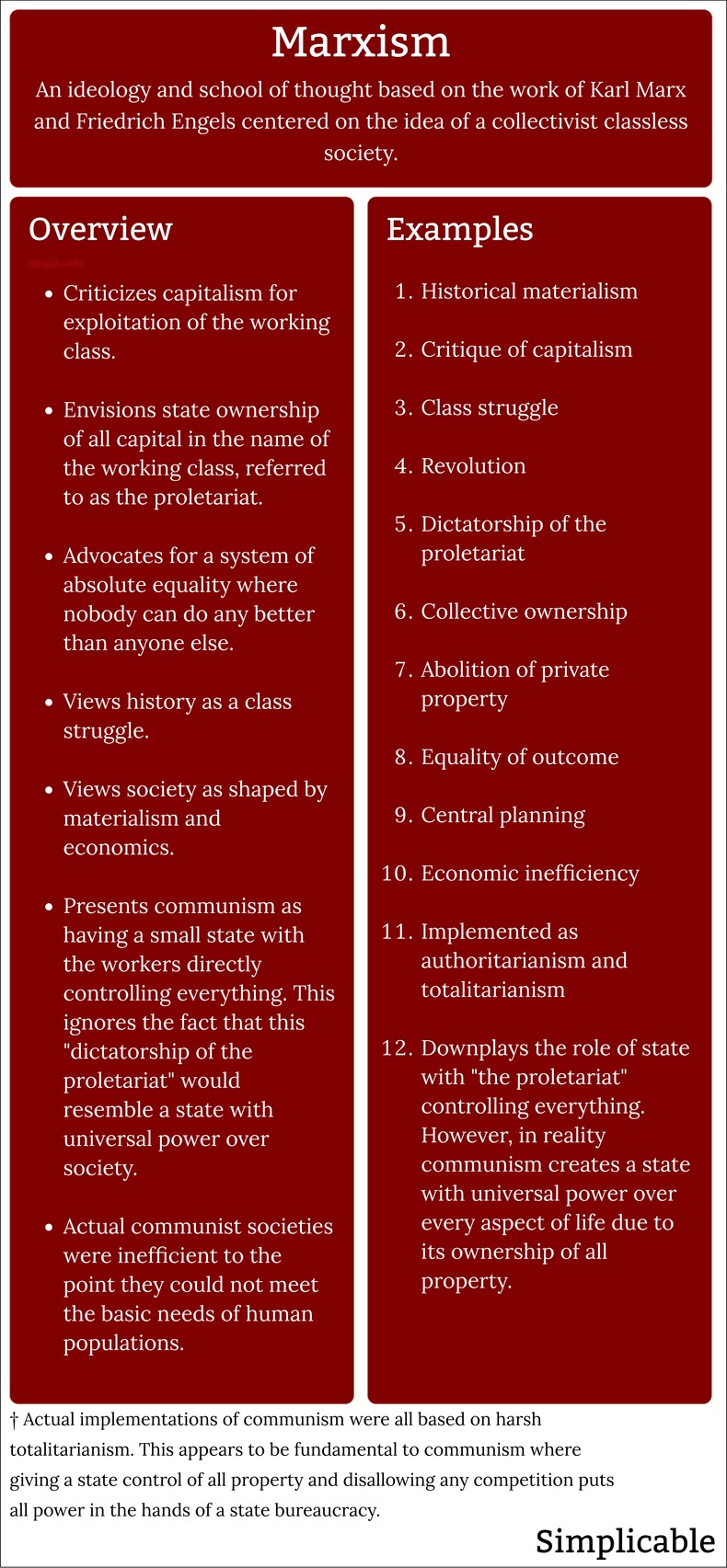
Discussion
Marxism has evolved and undergone various reinterpretations and adaptations since the time of Marx and Engels.| Overview: Marxism | ||
Type | ||
Definition | A school of thought loosely based on the theories of Karl Marx and Friedrich Engels particularly the idea that a collectivist classless society is desirable. | |
Related Concepts | ||

